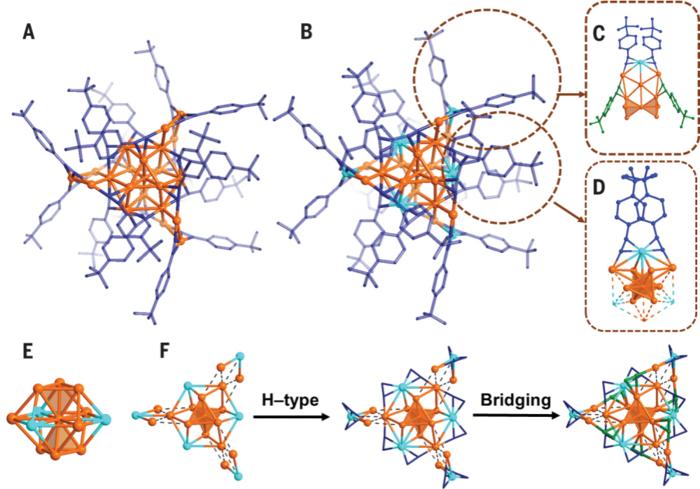| Mar 18, 2024 |
Researchers achieve >99% photoluminescence quantum yield in metal nanoclusters
(Nanowerk News) Professor Zhou Meng's team from the University of Science and Technology of China, in collaboration with Professor Wang Quanming's group from Tsinghua University, has made significant progress in the field of photoluminescence. Their research, published in Science ("Near-unity NIR phosphorescent quantum yield from a room-temperature solvated metal nanocluster"), details how they achieved a photoluminescence quantum yield (PLQY) greater than 99% at room temperature in near-infrared emission of metal nanoclusters in solution.
|
 |
| Molecular structures of Au22 and Au16Cu6, and structure anatomy of Au16Cu6. (Image by Prof. ZHOU’s team)
|
|
Gold nanoclusters (AuNCs) are promising for biomedical uses due to their near-infrared (NIR) emissions. However, their PLQY in the NIR spectrum has been disappointingly low, usually under 10%.
|
|
To overcome this, the researchers created Au22(tBuPhC≡C)18 (Au22) and its copper-doped version, Au16Cu6(tBuPhC≡C)18 (Au16Cu6), and explored their photophysical behaviors.
|
|
X-ray diffraction showed Au22 and Au16Cu6 have similar structures, with emission peaks at 690 nm and 720 nm, respectively. Remarkably, Au22 had a PLQY of 9% in air, while Au16Cu6's PLQY soared to 95%, and even 100% in a deaerated solution.
|
|
Further analysis using transient-absorption spectroscopy highlighted the excited-state dynamics of these nanoclusters, tracing their luminescence back to the triplet state. Under specific conditions, Au22 exhibited a slower response, while Au16Cu6 showed rapid relaxation due to its faster intersystem crossing rate, enhanced by copper doping.
|
|
This breakthrough demonstrates the possibility of achieving nearly perfect PLQY with gold-copper alloy nanoclusters at room temperature, paving the way for their application in biological imaging and luminescent devices.
|

